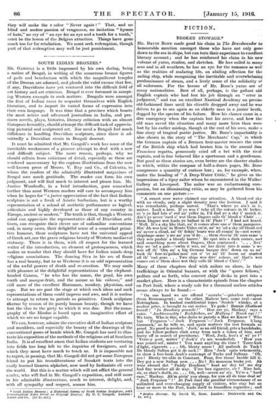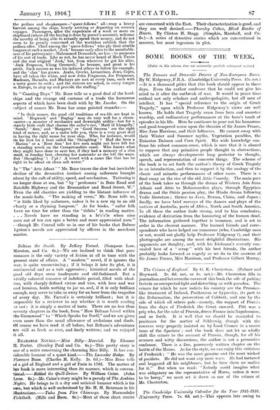FICTION.
BROKEN STOWAGE.* MIL DAVID Boxe made good his claim in The Brassbounder to honourable mention amongst those who have not only gone down to the sea in ships, but can turn their experience to excellent literary account ; and he has reinforced his claim in his new volume of yarns, studies, and sketches. He has sailed in many seas and in all weathers, he has an eye for the romance as well as the realities of seafaring life, an abiding affection for the sailing ship, while recognizing the inevitable and overwhelming predominance of steam, and a lively sense of the solidarity of all sailormen. For the heroes of Mr. Bone's yarns are of many nationalities. Best of all, perhaps, is the gallant old English captain who had lost his job through an "error in judgment," and ran an excellent Nautical Academy on precise old-fashioned lines until his clientele dropped away and he was driven to go to sea again as an elderly man in a junior berth, dogged by the spectre of his failure. How his chance came in a dire emergency when the captain lost his nerve, and how the old man saved the situation and many more lives than were lost by his earlier mishap, though at the cost of his own, make a fine story of tragical poetic justice. Mr. Bone's impartiality is also shown in the story of "The Merchants' Cup," in which the German captain of a Bremen four-master rescues the crew of the British ship which had beaten him in the annual San Francisco regatta, generously cried off a bet with the rival captain, and in fine behaved like a sportsman and a gentleman. But good as these stories are, even better are the shorter studies in which, within the compass of half-a-dozen pages, Mr. Bone compresses a quantity of curious lore ; as, for example, when, under the heading of "A Deep-Water Critic," he gives us the impressions of a tipsy sailor whom he encountered in the Walker Gallery at LiverpooL The sailor was an embarrassing com- panion, but an illuminating critic, as may be gathered from his comments on one picture :—
"A sunset over water claimed our attention. A blood-red sky with no clouds, only a slight density near the horizon. I said it was remarkable, perhaps unreal. 'That's where ye ain't in it, mister. Look a here. If ye wos t' take all the colours in th' locker, so 's ye had lots o' red an' yeller in, rd find ye a sky t' match it. Ain't ye never 'eard o' wot them Dagoes calls th' blood o' Chris' . them Dagoes wot loads ye ballast in th' Plate ? ' I had not heard. 'Well. It's a sky like that, an' it comes afore one o' them pamperos. Min' Air wos lyin' in Monte Video on'st, an' we 'ad a sky all blood-red an' never a cloud, an' th' fishin' boats wos all comin' in—not rowin' shipshape same 's me an' you 'd do ... them shovin' th' oars same 's they wos pushin' a bloody barrer.' He spat into a dark corner, and
said something more about Dagoes, then continued : . . Nex' day we 'ad a gale—'owlin it was, an' her divin' into it same 's we wos off th' Orn an' a big German barque driv' down on us an' took th' fore-to'gallan'mas' out o"er an' th' boom an' started all th' ead gear. . . . Two ships wos driv' ashore, an' that's wot comes out o' them skies wot they calls th' blood o' Chris'.'"
Many of these chapters deal with sailors on shore, in their traffickings in Oriental bazaars, or with the "queer fellows," pedlars and so forth, who convert ships' decks in port into a market-place. Here is a characteristic episode from the chapter on Port Said, where a ready sale for a thousand useless articles seems always to be found :—
"On one hand we are offered 'scarabs '—priceless antiques (from Brummagem) ; on the other, Maltese lace, some real—most Nottingham. In hushed confidential tones ` Scotch ' whisky, at a modest price, is brought to our notice. Ye gods ! Bonnie Shallow:I
brandt ! ` In Hamburg gemacht 'Moo are ye, Mackay,' says a voice. Auchtermuchty I Ecelefecks an' Mullguy ! Hooch aye ! ! ' We turn. Who is this, who dares to Parody a Man we Know ? Who but 'Ferguson Jock Ferguson Jock Ferguson, blang Greenock,' as he tells us, and again mutters the test formula as proof. No proof is needed. 'Jock,' as an old friend, gets a handshake, and his fellow-pedlars slink away from such a token of bias, and hurry off in search of greenhorns. 'Wed, Jock, boo's a' wr ye ? ' Verrr-y goot, mister' (' Jock's' r's are wonderful). 'How you was yourrr-ser, mister ? You want anyt'ing dis time ? Turrr-kish eigarrett. . . . Oh, blenty noose ! All mafeesh de Turk? De bloody Sultan got it de sack ! Here ` Jock ' spits vehemently, to show a free-born Arab's contempt of Turks and Sultans. '0, yes ! Blenty trr-uble in Constant. Four, five thous' beoble kill it. Dey got a new Sultan now. ... No! No monsoon broke yet. Ah miss aboard dat "Paddy Hendisen " boat an' dey ter me dey had fine weather all de way. Tree box cigarette, sir ? Nine bob, sir, as shair's daith, sir.... Oh, well—seven an' six. Ye're a "hard case," Mackay. Ah'm givin' you sheep, for you all de time deal "Jock Ferguson" I' At Port Said the peculiar circumstanoe of tut unlimited and ever-changing supply of visitors, who stay but an hour or more in the Port, lends itself to boundless rogueries; and _• Broken Stowage. By David W. Bone. London: Duckworth and Coe Ga. net.1 the pedlars and shopkeepers—' queer-fellows' all—reap a heavy harvest among the ships, hourly arriving or departing on oversea voyages. Passengers, after the experience of a week or more on shipboard (where all the buying is done by purser's account), welcome the novelty of being able to actually spend their money, and do not seem to be greatly concerned at the worthless rubbish that the pedlaraoffer. Chief among the 'queer-fellows' whe ply their nimble tongues at such a market, 'Jock' became early alive to the unsuitable- ness of his patronymic—Mahommed Dessoukeh, no less—to purposes of his sort of trade. Like as not, he has never heard of Mark Twain and the real original 'Jock,' but, from wherever he got his alias, Jock Ferguson, blong Greenock,' he became, and great is his profit.. Such success as was his induced others to follow his example, and the ' clan ' has grown. Arabs, Greeks, Levantines, Jews, Copts, have all taken tho whim, and now John Fergasons, Joe Fergusons, Macleans, Macnabs, and Maekays are met at every turn, each with a sorry goose to cook ; and the visitors are asked, in every tongue in Europe, to step up and provide the staffing."
In "Coasting Days" Mr. Bone tells us a good deal of the hard- ships and the strange old customs of a trade the humorous aspects of which have been dealt with by Mr. Jacobs. On the aubject of names Mr. Bone has some pointed remarks :—
"In their names, the good old traditions of sea-life are kept in mind. 'Hogwash' and Buglup ' may do very well for a steam- carrier—a monster of mechanics and downright utility—but for a stately little craft that charms the sailor's eye, Maid of Llangelly,' 'Sarah,' Ann,' and 'Margaret,' or Good Success' are the right kind of names, and, as a sailor tells you, there is a very great deal in having the right name for your ship. Who, for instance, would do his best for a boat called the Sheughbog ' ? Had she been a ' Marian ' or a Rose Ann' her five men might not have left her a standing wreck on the Carnarvonshire coast. Who knows what they might have done to save her, if they had a memory of a slim maid, in Sunday best, cheering her namesake as she left the ways. But Sheughbog ' Ugh I A vessel with a name like that has no right to be afloat on clean salt water."
In "The 'Arts Afloat' "Mr. Bone traces the slow but inevitable decline of the decorative instinct among sailormen brought about by the cult of utility, speed, and mechanism. Tattooing is no longer done at sea, but "by ' professors ' in Bute Road and Ratcliffe Highway and the Broomielaw and Bond Street, W." Even the old chanties are yielding to the blatant influence of the music-halls. "The making of verse," Mr. Bone tells us, "is little liked by sailormen, unless it be a. new rig to an old chanty or a rhyming lampoon." As for books, "sailor folk have no time for other than the ` titbits ' in reading matter. . . . Novels have no standing in a fo'c's'le when nine men out of ten can spin a better and more appreciated yarn" --though Mr. Conrad tells us in one of his books that Bulwer Lytton's novels are appreciated by officers in the merchant marine.



































 Previous page
Previous page